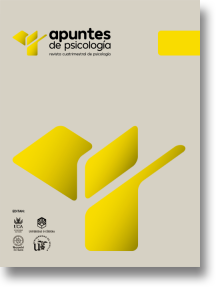Learning process in psychotherapy
DOI:
https://doi.org/10.55414/aqcx5a34Keywords:
Process Research, Results Research, Therapeutic Process, Observational MethodologyAbstract
In this work we expose the need to promote process research as the most appropriate way to understand and explain the therapeutic process while questioning the methodology used in results research, currently predominant for the study of clinical intervention: comparison of groups, random assignment of subjects or classification with diagnostic labels that make it difficult to study the therapeutic process and identify the elements that make a treatment have a certain effect. Against this type of research, a series of studies are presented that defend the use of observational methodology for the identification of the learning processes that would be responsible for change in therapy, as well as the analysis of therapeutic interaction from a functional perspective: taking into account that psychological therapy is fundamentally spoken, it is proposed that the optimal way to analyze it is based on the study of the verbal interaction between client and therapist. Therefore, we present a coding system of verbal interaction that we propose as a tool to identify the functions of the therapist's verbal behavior during the clinical intervention process. In addition, in the different works, an analysis has been carried out on the role played by instructions, the processes of reinforcement and discriminative control, the transfer of functions through pairings and language as a collaborative process.
References
APA Presidential Task Force on Evidence-Based Practice (2006). Evidence-based practice in psychology. American Psychologist, 61(4), 271-285. https://doi.org/10.1037/0003-066X.61.4.271
Arias-Holgado, M.F., Fernández-Serra, F. y Perona-Garcelán, S. (2000). Psicología básica, psicología aplicada y metodología de investigación: el caso paradigmático del análisis experimental y aplicado del comportamiento. Revista Latinoamericana de Psicología, 32(2), 277-300
Barkham, M., Lutz, W., Lambert, M.J. y Saxon, D. (2017). Therapist effects, effective therapists, and the law of variability. En L.G. Castonguay y C.E. Hill (Eds.), How and why are some therapists better than others Understanding therapist effects (pp. 13-36). American Psychological Association. https://doi.org/10.1037/0000034-002
Catania, A.C. (1992). Learning (3th Ed.). Prentice Hall.
Chambless, D.L. y Hollon, S.D. (1998). Defining empirically supported therapies. Journal of Consulting and Clinical Psychology, 66(1), 7-18. https://doi.org/10.1037/0022-006X.66.1.7
Follette, W.C., Naugle, A.E. y Callaghan, G.M. (1996). A radical behavioral understanding of the therapeutic relationship in effecting change. Behavior Therapy, 27(4), 623-641. https://doi.org/10.1016/S0005-7894(96)80047-5
Forte, L.A., Timmer, S. y Urquiza, A. (2014). A brief history of Evidence-Based Practice. En S. Timmer y A. Urquiza (Eds.), Evidence-based approaches for the treatment of maltreated children: Considering core components and treatment effectiveness (pp. 13-18). Springer. https://doi.org/10.1007/978-94-007-7404-9_2
Frank, J.D. (1982). Therapeutic components shared by all psychotherapies. En J. Harvey y M.M. Parks (Eds.), Psychotherapy research and behavior change (Vol.1). APA.
Froján-Parga, M.X., Montaño-Fidalgo, M. y Calero-Elvira, A. (2006). ¿Por qué la gente cambia en terapia? Un estudio preliminar. Psicothema, 18(4), 797-803.
Froxán-Parga, M.X, Alonso-Vega, J., Trujillo-Sánchez, C. y Estal-Muñoz, V. (2018). Eficiencia de las terapias: ¿un paso más allá de la eficacia? Análisis crítico del modelo cognitivo-conductual. Apuntes de Psicología, 36(1-2), 55-62. https://doi.org/10.55414/ap.v36i1-2.711
Gimeno-Peón, A. y Mateu-Hernández, C. (2020). Hacia la Evidencia Basada en la Práctica en psicoterapia. Revista de Psicoterapia, 31(117), 179-194. https://doi.org/10.33898/rdp.v31i117.387
Goldstein, M.R. y Krasner, L. (1987/1991). La psicología aplicada moderna. Pirámide.
Greenberg, L.S. (1986). Change process research. Journal of Consulting and Clinical Psychology, 54, 4-9. https://doi.org/10.1037/0022-006X.54.1.4
Hayes, S.C., Hofmann, S.G., Stanton, C.E., Carpenter, J.K., Sanford, B.T., Curtiss, J.E. y Ciarrochi, J. (2019). The role of the individual in the coming era of process-based therapy. Behaviour Research and Therapy, 117, 40-53. https://doi.org/10.1016/j.brat.2018.10.005
Hofmann, S.G. y Hayes, S.C. (2019). The future of intervention science: Process-Based Therapy. Clinical Psychological Science, 7(1), 37-50. https://doi.org/10.1177/2167702618772296
Kohlenberg,R.J. y Tsai.,M. (1991). Functional Analytic Psychotherapy: Creating intense and curative therapeutic relationships. Plenum Pres. https://doi.org/10.1007/978-0-387-70855-3
La Roche, M.J. y Christopher, M.S. (2009). Changing paradigms from empirically supported treatment to Evidence-Based Practice: A cultural perspective. Professional Psychology: Research and Practice, 40(4), 396-402. https://doi.org/10.1037/a0015240
Lambert, M.J. y Berguin, A.E. (1994). The effectiveness of psychotherapy. En A.E. Berguin y S.L. Garfield (Eds.), Handbook of psychotherapy and behavior change (pp. 143-189). Wiley.
Norcross, J.C. y Wampold, B.E. (2011). Evidence-based therapy relationships: Research conclusions and clinical practices. Psychotherapy, 48(1), 98. https://doi.org/10.1037/a0022161
Pérez-Álvarez, M., Fernández-Hermida, J.R., Fernández-Rodríguez, C. y Amigo-Vázquez, I. (2003). El fin de la inocencia en los tratamientos psicológicos. Análisis de la situación actual. En M. Pérez-Álvarez, J.R. Fernández-Hermida, C. Fernández-Rodríguez y I. Amigo-Vázquez (Coords.), Guía de tratamientos psicológicos eficaces (I). Adultos (pp. 17-34). Pirámide.
Schober, M.F. y Clark, H.H. (1989). Understanding by addressees and overhearers. Cognitive Psychology, 21(2), 211-232. https://doi.org/10/cbt9qw
Skinner, B.F. (1938). The behavior of organisms: An experimental analysis. Appleton-Century.
Task Force on Promotion and Dissemination of Psychological Procedures (1993). A report adopted by the Division 12 Board. American Psychological Association. https://doi.org/10.1037/e550782009-001
Tsai, M., Kohlenberg, R.J., Kanter, J.W., Kohlenberg, B. y Follette, W.C. (2009). Una guía de la Psicoterapia Analítica funcional: conciencia, coraje, amor y conductismo. Psara Editorial.
Wampold, B.E. (2013). The great psychotherapy debate: Models, methods, and findings. Routledge. https://doi.org/10.4324/9780203893340
Weinberger, J. (1993). Common factors in psychotherapy. En G. Stricker y J.R. Gold (Eds.), Comprehensive hadbook of psychotherapy integration (pp. 43-56). Plenum Press.
Wolpe, J. (1969). La práctica de la terapia de conducta. Trillas.
Zettle, R.D. (2020). Treatment manuals, single-subject designs, and evidence-based practice: A clinical behavior analytic perspective. The Psychological Record, 70(4), 649-658. https://doi.org/10.1007/s40732-020-00394-2
Downloads
Published
Issue
Section
License
Copyright (c) 2024 Apuntes de Psicología

This work is licensed under a Creative Commons Attribution-NonCommercial-NoDerivatives 4.0 International License.


















